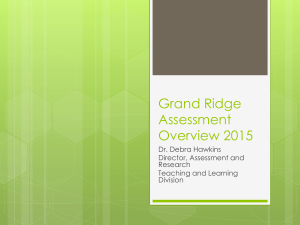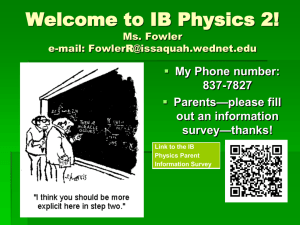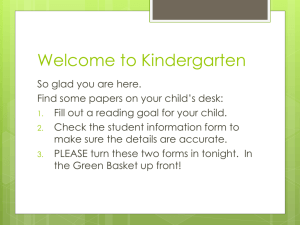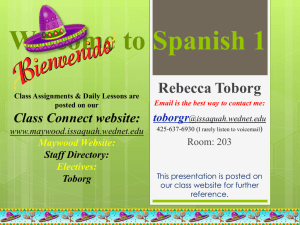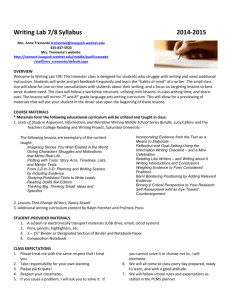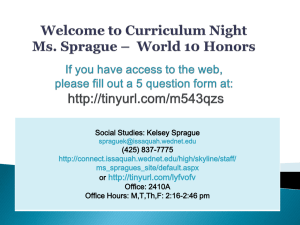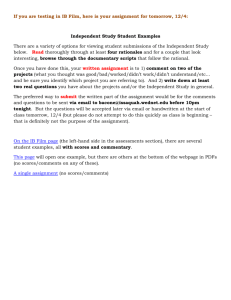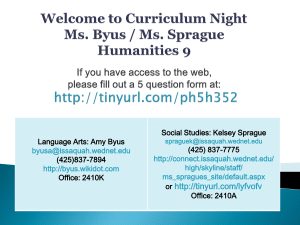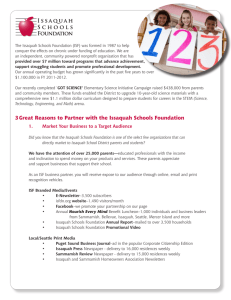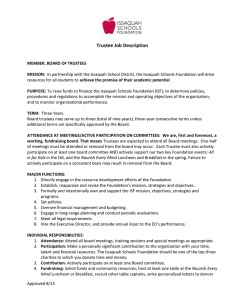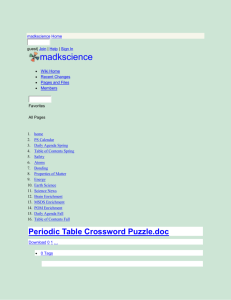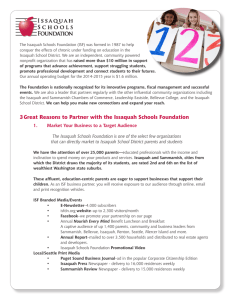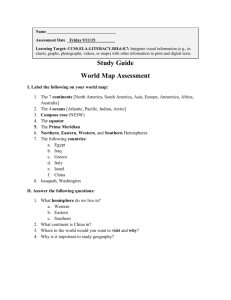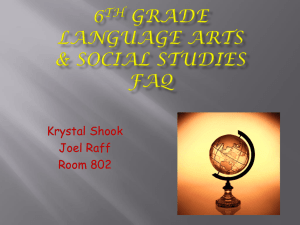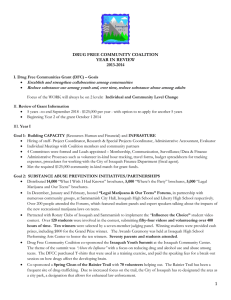Welcome to Curriculum Night!
advertisement
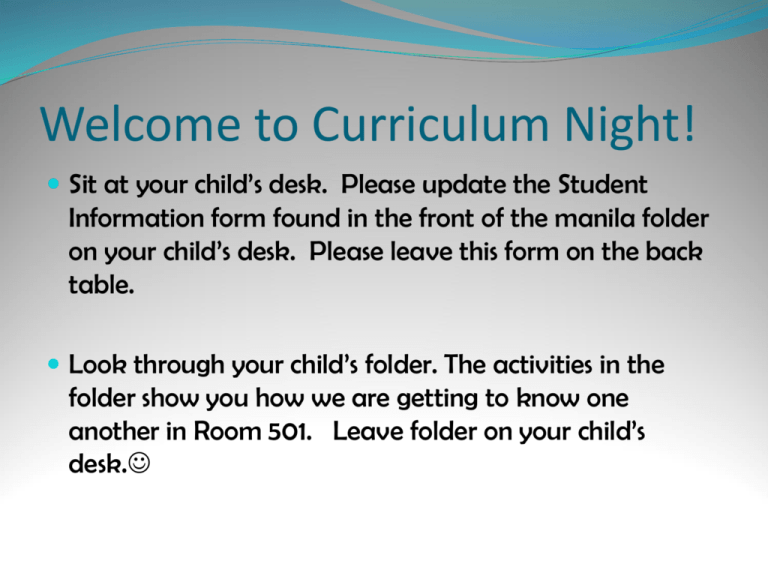
Welcome to Curriculum Night! Sit at your child’s desk. Please update the Student Information form found in the front of the manila folder on your child’s desk. Please leave this form on the back table. Look through your child’s folder. The activities in the folder show you how we are getting to know one another in Room 501. Leave folder on your child’s desk. Important Forms **Conferences are Wednesday, December 2nd and Thursday, December 3rd **You will sign up for conferences online from November 2nd to November 25th. More information to come. Go to Sunny Hills website and sign up for E-News if you are new to our school. Fill out a Parent Volunteer Interest Survey located on the back table, if you have not already done so….I still need a Room Coordinator. Fourth Grade Curriculum Writing: Reading: • MAKING MEANING, our reading district adoption • Scholastic News • Nightly reading • Book Reports • Library time (once a week) • www.issaquah.wednet.edu/tls/standards.asp • Standards based grading (4,3,2,1)*--”3” is standard • Lucy Calkins’ Writing Program • Writers’ Notebooks • Word Work: Greek roots and rules of spelling • Monthly Book Reports* • Cursive Book Reports October and November—written book reports (October: in-class written report; November: report written at home); no book report in December January-May—book projects across the multiple intelligences (except February—Washington Festival speech writing). Students will soon have copies of the guidelines for written book reports. Book project directions will be coming home in January. Fourth Grade Curriculum Social Studies: • Regions of Washington • State Government • Fourth Grade Festival* • The Pacific Rim/Trade • Junior Achievement • Pony Pals with Mrs. Kathy Dunn’s class Science: • Food Webs/Ecosystems/Life Science/Stewardship of the Millennium Garden (Adopt a plant) • States of Matter/Physical Science • The Changing Earth/Earth Science • Health • Photography*--integrated with science and other core subjects; teaches observational skills; aligns with JA; gets children outdoors Mathematics and Everyday Math Major Units: Naming and constructing geometric figures Using numbers and organizing data Multiplication Big Numbers/Estimation/Computation Division Decimals and their uses Mid-Year Assessment Fractions and their uses Perimeter and Area Reflections and Symmetry Measurement Mastery of multiplication facts by January is our goal. Emphasis is placed on being able to communicate mathematical understanding with words, diagrams, and pictures. Everyday Math Answer Keys for each unit--on my Connect site under FILES. The answer keys are found at the end of the “Family Letters” for each unit. Study Links correspond with the day’s lesson—PARENTS ARE ASKED TO CORRECT STUDY LINK EACH NIGHT, and initial the study link. On-line access for families for IXL practice Student Reference Books Other Curriculum Areas Physical Education and Health Music with Mr. Phil Donley Library Technology: Word, Power Point Weekly keyboarding lessons (please monitor this process at home--see that your child is using the “home row keys” when keyboarding in order to build speed)* Classroom Systems Homework posted on Connect under the BLOG tab Newsletters/Homework/Projects—on Connect connect.issaquah.wednet.edu—click on “Elementary Schools”—click on “Sunny Hills Staff”—find my site Email: ulrichj@issaquah.wednet.edu Binders are used to file on-going work, finished work, and homework Daily Planners—initial each evening* Monthly Reading Star Forms: optional Parent information comes home on Thursdays, and corrected work comes home on Friday (check binder) ICMM Program Homework Expectations Nightly work (except Fridays) should take your child about 40-50 minutes. This includes: 10 minutes on IXL (or other math program,) About 10+ minutes for math study links, keyboarding, and/or other tasks across the multiple intelligences 20 minutes of stamina reading Mrs. Lederman will briefly discuss homework at a short meeting in the MPR following my presentation. **Book reports and larger projects take more time. ICMM Program Definition: “I Can Manage Myself” Behavior/Work Completion Slip needs signature Pins are worn to show accomplishment Special privileges for earning the weekly pin Aligns with LOVE AND LOGIC and Sean Covey’s, THE SEVEN HABITS OF HAPPY KIDS Field Trips/Parties State Capital – March 29, 2016 Washington Festival Day—February 26, 2016 International District –June 9, 2016 Kite Design Class at school –May 27, 2016 PARTIES: Harvest Party (Oct 30st); Valentine’s Party (Feb. 12th); End of Year Party (June 15th) Enriches student experiences through science*, and the arts* -Art Enrichment: Carrie Phillips, artist: December: Trees; April: sumi painting Art Enrichment: Smart Art (new this year): clay, chalk, glass, and collage Science Enrichment: Two hands-on science labs with Kate Poaster Book fairs Fundraisers Popcorn days Yummy staff lunches Scholarships for school materials and field trips Classroom monies for enrichment Holiday giving Sock hop PE, music, and library support Brainpop membership GLAD training Volunteering * The Room Coordinator will handle parent communication for helping in the classroom, parties, and special projects. Reading and Writing Conference Training dates/times with Eric Nelson: TBD All Volunteers are required to fill out forms: These forms are available ONLY online. *WA State Patrol sheet (both sides) Volunteer checklist Hold Harmless Agreement Thank you for coming! Remember to: Sign up for a conference, online. (Information is coming, soon, as to how to sign up). Sign up to volunteer, (including signing up to help in the library). Also, fill out a Parent Survey Form located on the back table View this presentation on my Connect Site Email me if you have questions at: ulrichj@issaquah.wednet.edu Sunny Hills and ISF A K-5 Science Curriculum adoption to ensure our students meet state requirements and experience the wonder of science. Leveled Bookroom to Support Literacy Curriculum – Classrooms are filled with children of all abilities and learning styles. The Leveled Reading Rooms at our elementary schools provide teachers with ‘just right’ reading materials for every child –whether struggling, at grade level or advanced. The curriculum is the foundation of the District’s elementary literacy goal of ensuring all students not only ‘learn to read,’ but can ‘read to learn’ by the 3rd grade. Updated Library Media Collection to Enhance Instruction – To upgrade the library of media collection of DVD's to provide supplemental instruction tools for the teachers and students it supports. VOICE (Volunteers of Issaquah Changing Education) – a mentor/tutor program that pairs caring community volunteers with struggling students to improve academic performance, boost self-esteem, and help curb the high-school dropout rate. Basic Student Needs Collaboration – In conjunction with the PTSAs, IEA and school nurses, ISF is helping to develop and fund programs that eliminate the underlying issues that keep students from being successful in school such as eyeglasses, access to dental care, school supplies, prescriptions, breakfast foods, warm clothing, etc.
